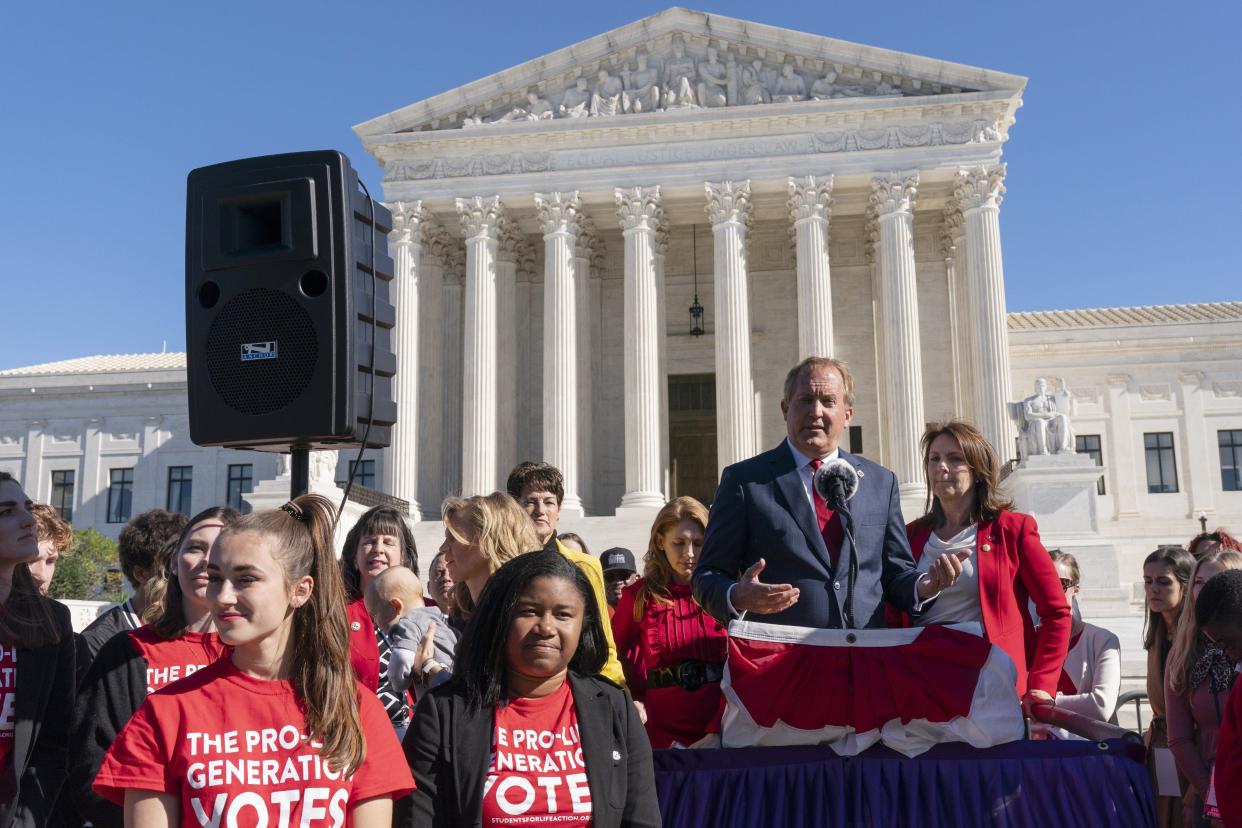How the Supreme Court's ruling on a Mississippi abortion law will affect Texas

WASHINGTON – The U.S. Supreme Court will hear arguments Wednesday in a major challenge to Mississippi's 15-week ban on abortion, a case that will have major implications in Texas and other conservative states.
The new abortion law in Texas, the nation's most restrictive, prohibits the procedure after six-weeks gestation and allows any private individual to sue abortion providers or those who "aid and abet" a procedure that violates the law.
While legal challenges to the law are pending — including two before the Supreme Court — doctors in Texas have stopped performing abortions that violate the law and have instead directed patients to clinics in other states, if they have the means to travel.
More: Her fetus no longer viable, Texas woman describes crossing state lines to have an abortion
Abortion rights advocates say the situation in Texas could be a preview of what's to come in other parts of the country should Mississippi prevail in Wednesday's case. Plus, navigating the legal landscape will get more complicated for patients in Texas if clinics in other states are forced to close their doors.
Several conservative states have approved abortion bans in anticipation of a ruling from the Supreme Court, or had adopted bans prior to the court establishing a constitutional right to the procedure in its landmark Roe v. Wade decision in 1973.
In Texas, a law passed before Roe v. Wade bans abortion and a so-called trigger ban adopted this year would criminalize abortion to the extent permitted by the Supreme Court.
Nine states adopted abortion bans before Roe v. Wade was decided, including Alabama, Arizona, Wisconsin and West Virginia, according to an analysis by the Guttmacher Institute, a research group that supports abortion rights. Eight additional states have adopted trigger bans, including Idaho, Kentucky and Tennessee.
Four states — Arkansas, Mississippi and Oklahoma, in addition to Texas — passed abortion bans prior to Roe v. Wade and have adopted trigger bans, according to the Guttmacher Institute.
More: Texas judge hears legal challenges to restrictive abortion law on Wednesday
Trigger laws
Exactly how and when those laws would take effect varies by state and will depend a great deal on how the Supreme Court rules. A decision to uphold Mississippi’s 15-week ban but to leave in place the constitutional right to abortion, for instance, would almost certainly create confusion, a flood of lawsuits and legislation, experts said.
"You have to think that these trigger laws will trigger, so to speak, to the extent that there's some ambiguity about the court’s decision,” said Neal Devins, a law professor at William & Mary Law School.
A USA TODAY review of the trigger laws found the potential for ambiguity. Several states permit attorneys general to make a determination about whether the Supreme Court has overruled Roe v. Wade. The Texas law would take effect 30 days after an applicable ruling from the Supreme Court and would not necessitate the involvement of the Legislature or other officials.
More: Watch replay: Gov. Greg Abbott signs law restricting abortion pill access in ceremonial signing
Missouri permits the governor or the state Legislature, through a vote, to make that determination. Utah permits lawyers for the state Legislature to decide exactly what it is the high court has ruled.
Because the Supreme Court's decision may be something less clear than a black-or-white decision that overrules or upholds Roe, that could leave leeway for officials.
Eight of the trigger laws were approved in 2019 after the Senate confirmed President Donald Trump’s second nominee to the Supreme Court, Associate Justice Brett Kavanaugh. That corresponds with a broader push by conservative states to enact laws restricting the procedure to test the court’s commitment to Roe.
Roe established the right to obtain an abortion through the end of the second trimester, or roughly by the end of the 26th week of pregnancy. A subsequent decision in 1992 ended the trimester framework and ruled people could obtain an abortion until viability, the point when a fetus can survive outside the womb or about 24 weeks.
Roughly half of states have approved laws shortening that 24-week timeframe, most of which have been struck down by lower federal courts.
Like Mississippi, lawmakers in Louisiana approved a ban on abortion after 15 weeks. Arkansas and Utah approved bans at 18 weeks.
Tennessee and Missouri approved "cascading" bans that attempt to prohibit abortions in two- or four-week increments.
Those laws have all been blocked by federal courts.
More: 'Magical thinking': Gov. Abbott says he will 'eliminate all rapists,' defends Texas abortion law
'Kitchen sink approach'
Hillary Schneller, a senior staff attorney at the Center for Reproductive Rights, which represents the clinic in the Mississippi case, said the laws underscore the "kitchen sink approach" that many conservative states take.
"The ultimate goal is just to ban abortion at any point or entirely," she said.
At least 14 states, including California, New York and Illinois, have approved laws protecting the right to abortion. A ruling overturning Roe would create different levels of access depending on the state.
That could be the case even if the Supreme Court doesn't overturn Roe. If the justices uphold Mississippi's law without ruling on whether the constitutional right to an abortion should be nullified, conservative state legislatures will almost certainly move with speed to adopt their own 15-week bans, experts said.
"If they uphold 15 weeks on its face and say that's the new standard, I think we'll see states pass 15-week limits," said Mallory Quigley with the anti-abortion group Susan B. Anthony List. "I think we'll continue to see pro-life advocates and lawmakers at the state level challenge whatever the status quo is going to be."
This article originally appeared on Austin American-Statesman: How will the Supreme Court's ruling on a Mississippi abortion law affect Texas?

